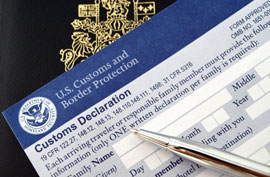
You've been out of the country on your much-deserved yearly vacation. About an hour before your plane lands in the United States, the flight attendant hands you a customs declaration form. Chances are you purchased a few souvenirs or gifts during your travels -- so which ones do you have to declare? The answer: Every item you didn't have with you when you left the United States.
You'll be asked how much you paid for each, including all taxes -- so it helps to keep those receipts in an easily accessible place. You may also want to pack all of these items together so that you can find them quickly if you're chosen for inspection.
The list below is from the U.S. Customs and Border Protection Web site and outlines the rules for what needs to be declared:
- Items you purchased and are carrying with you upon return to the United States.
- Items you inherited.
- Items you bought in duty-free shops, on the ship or on the plane.
- Repairs or alterations to any items you took abroad and then brought back, even if the repairs/alterations were performed free of charge.
- Items you brought home for someone else.
- Items you intend to sell or use in your business, including business merchandise that you took out of the United States on your trip.
Contrary to popular belief, purchasing something in a duty-free shop does not necessarily mean you don't have to pay any duties or taxes on it; the item is only duty-free in the country where you bought it. If the value of the item falls outside your personal exemption (see below), you will have to pay U.S. duties on it.

10 Things Not to Wear When Traveling Abroad
Register Your Items
To avoid confusion, the CBP recommends that you register certain items before you leave the United States -- that way you can prove that you owned an item before you left. This is particularly important for expensive foreign-made items like laptops or watches. You can register the items at the nearest CBP office or at the international airport from which you are departing -- just request a Certificate of Registration (CBP Form 4457) and have the items (including serial numbers) handy.
Duty-Free Exemptions
In most cases, travelers are permitted to bring up to $800 worth of merchandise back to the United States without having to pay duty. (Numerous exceptions apply.) Keep in mind that only one liter of alcohol, 200 cigarettes and 100 cigars may be included in this exemption.
Family members who live in the same household and travel together may combine personal exemptions. Children and infants have the same exemptions as adults except for alcohol and tobacco products. If you bring back more than your exemption, you will have to pay duties.

Get the Best Exchange Rate

Duty-Free and Reduced Rates
Items from certain countries may be duty-free under previously negotiated agreements with the United States government. Typically, items from Caribbean and Andean countries, sub-Saharan African countries, Israel, Jordan, Chile, Singapore, Canada, and Mexico are allowed into the United States at a duty-free or reduced rate. However, keep in mind these items still need to be declared when you re-enter the United States.
Also, household effects -- such as furniture, paintings, carpets, linens and similar items -- are duty-free if you've used them for at least a year while living abroad, and they are not intended for resale or use as gifts. For more information, see the CBP's guide to duty-free or reduced rates.
Currency
You can take out or bring unlimited "monetary instruments," as the Customs folks call cash, money orders, traveler's checks and the like, but if you are carrying more than $10,000 worth, you must file a Currency Reporting Form with U.S. Customs.
Prohibited and Restricted Items
Some items -- such as firearms, fruits, vegetables, plants, seeds, meat products and some cultural artifacts -- are restricted and will only be admitted into the U.S. under special circumstances. Others, including absinthe and most items from embargoed countries, are prohibited entirely. Check the CBP's list of prohibited and restricted items before you leave.
Paying Duty
If you owe duty, it must be paid upon arrival in the United States. You may pay with U.S. currency, a personal check drawn on a U.S. bank, or a government check, money order or traveler's check (as long as the amount is less than $50 more than the duty you owe). Some locations also accept payment in credit cards.
Mailing Items from Overseas
Your exemption applies only to those things you have on your person when you return to the United States; if you mail anything back, you're responsible for paying the duties and taxes on those items separately. For more information, see the CBP's information on sending items back to the U.S.
 You've been out of the country on your much-deserved yearly vacation. About an hour before your plane lands in the United States, the flight attendant hands you a customs declaration form. Chances are you purchased a few souvenirs or gifts during your travels -- so which ones do you have to declare? The answer: Every item you didn't have with you when you left the United States.
You've been out of the country on your much-deserved yearly vacation. About an hour before your plane lands in the United States, the flight attendant hands you a customs declaration form. Chances are you purchased a few souvenirs or gifts during your travels -- so which ones do you have to declare? The answer: Every item you didn't have with you when you left the United States. 10 Things Not to Wear When Traveling Abroad
10 Things Not to Wear When Traveling Abroad Get the Best Exchange Rate
Get the Best Exchange Rate Duty-Free and Reduced Rates
Duty-Free and Reduced Rates